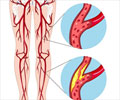People who have peripheral artery disease(PAD) have a low Omega-3 Index compared to people who doesn't have PAD.

‘Minute reduction in Omega-3 Index found to increase the risk peripheral artery disease. Omega- 3 helps to lower inflammatory burden, warding off the development of PAD.’
Read More..




Because PAD is essentially atherosclerosis of the leg arteries, researchers in this study believe that patients with PAD may have an omega-3 fatty acid deficiency. Read More..
To study the relationship between the Omega-3 Index and PAD, the investigators compared the Omega-3 Index in 145 patients with PAD to 34 controls without PAD.
They found that the Omega-3 Index was significantly lower in the PAD patients than the controls (5% vs 6%). When they controlled for other patient characteristics that might have influenced these findings (like age, smoking, blood pressure, diabetes, drugs, etc.), the Omega-3 Index was still lower in the cases vs. the controls.
In the final analysis, for every 1% unit reduction in the Omega-3 Index, the odds of being a PAD patient increased by 39%, and for every additional pack-year of smoking the odds of being a PAD case increased by 4%.
"It is likely that the lower inflammatory burden associated with a higher Omega-3 Index may be part of the explanation for these results," said Bill Harris, Ph.D., one of the study's authors. "Whether long-term use of omega-3 supplements and/or increased consumption of oily fish could prevent the development of PAD should be examined in future studies."
Advertisement
Source-Eurekalert










